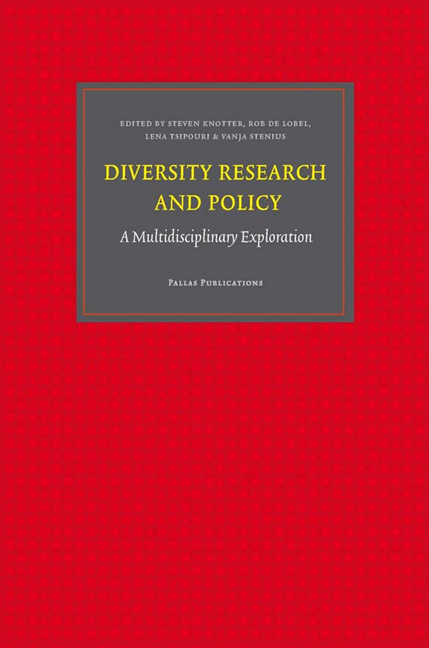Book contents
- Frontmatter
- Contents
- Acknowledgements
- 1 An Introduction
- 2 Diversity and Social Anthropology
- 3 Diversity and Sociology
- 4 Diversity and Criminology
- 5 Diversity and Ecology/Ecological Economics
- 6 Linguistic Diversity
- 7 Diversity and Architecture
- 8 Diversity and Urban Planning
- 9 Diversity and Economics
- 10 Diversity and Diversity Management in Business and Organisation Studies
- 11 Diversity and (Organisational) Psychology
- 12 Diversity and Law
- 13 Diversity and Public Policy
- 14 Conclusion
- About the Authors
- About the Reviewers
9 - Diversity and Economics
Published online by Cambridge University Press: 15 January 2021
- Frontmatter
- Contents
- Acknowledgements
- 1 An Introduction
- 2 Diversity and Social Anthropology
- 3 Diversity and Sociology
- 4 Diversity and Criminology
- 5 Diversity and Ecology/Ecological Economics
- 6 Linguistic Diversity
- 7 Diversity and Architecture
- 8 Diversity and Urban Planning
- 9 Diversity and Economics
- 10 Diversity and Diversity Management in Business and Organisation Studies
- 11 Diversity and (Organisational) Psychology
- 12 Diversity and Law
- 13 Diversity and Public Policy
- 14 Conclusion
- About the Authors
- About the Reviewers
Summary
A Brief Description of the Discipline of Economics
Economics is the discipline that studies the production, distribution and consumption of goods and services. Within the discipline, however, there has been disagreement since the days of Adam Smith on fundamental issues and on the strict definition of the term economics. What is economics? What should economics be? Is economics a true “science”? (Shiffman 2004). In his Essay on the Nature and Significance of Economic Science, Lionel Robbins defines economics as: “the science which studies human behaviour as a relationship between ends and scarce means which have alternative uses” (1932). Scarcity is a situation in which available resources are insufficient to satisfy all wants and needs, requiring alternative uses to be assessed aiming at optimising utility. Alternative uses, combinations of production factors, and the utility of goods and services can be mathematically portrayed, and thus economics can take the form of exact science. This definition of economics was adopted by Paul Samuelson and was popularised via his best-selling textbook (Shiffman 2004: 1086). But it has been strongly criticised by non-neoclassics. He defined economics as a deductive science, which derives all of its conclusions from the axioms of rational choice. He held these conclusions to be valid in all times and circumstances. Effectively, Robbins managed to exclude the entire corpus of institutionalist and historicist work from the field. Alternative approaches to the neoclassical model have emerged precisely from the need to better combine economics with social sciences. In a more modern approach, Gregory Mankiw considers that “Economics combines the virtues of politics and science. It is, truly, a social science. Its subject matter is society – how people choose to lead their lives and how they interact with one another. But it approaches the subject with the dispassion of a science” (2007).
No matter what school of thought, diversity is not systematically addressed within the study of economics; it is, however, increasingly used as an explanatory variable for many economic relationships. In neoclassical economics, the current orthodoxy of the profession and the underlying principles of rationality and market organisation leave little, if any, room for identifying – let alone studying – diversity.
- Type
- Chapter
- Information
- Diversity Research and PolicyA Multidisciplinary Exploration, pp. 135 - 158Publisher: Amsterdam University PressPrint publication year: 2012

